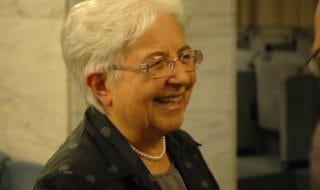
Nov 15, 2016 | Focolare Worldwide, Senza categoria
 “Every day we are presented with images of a world torn by conflicts of all kinds; we see walls being built, migrants and refugees fleeing from poverty and war; and contrasting forms of political self-interest fail to consider the human consequences of their actions.” This was Focolare President Maria Voce’s description of the world scene today, in a talk read on her behalf by Catherine Belzung. This world scene, she recalled, has often been described by Pope Francis as a “piecemeal third world war”. Its violence is unconventional, ubiquitous and pervasive; it is hard to defeat with the tools used up to now. … These conflicts can only be ended through collective commitment, not only on the part of the international community but by the community of all people in the world. No one can consider themselves excluded from this process. It must go through our streets, into our workplaces, our educational establishments, into sports centres and places of entertainment, communication and worship. The response to the “piecemeal world war” is to build world peace “one piece at a time”, through small steps, and concrete gestures. Everyone has a role to play. Everyone is responsible.” Maria Voce emphasised the commitment of international organisations, civil society, associations and movements. She mentioned her own movement which draws on the experience of 70 years of work for unity and peace initiated by Chiara Lubich and taken ahead in the most varied parts of the world in a 360ͦ dialogue, with in the Christian world, with other religions and with people of non-religious beliefs. It is a dialogue “founded on receptivity to people, on a deep understanding of their choices and ideas, appreciating all that is beautiful and positive, all that we might hold in common and that can create bonds. Fraternity can give rise to projects and actions in the complex political, economic, cultural and social fabric of our world. Fraternity Maria Voce affirmed, quoting Chiara Lubich “can give rise to projects and actions in the complex political, economic, cultural and social fabric of our world. Fraternity brings peoples out of their isolation and can offer the opportunity for development to those still excluded from it. It shows us how to resolve differences peacefully and relegates war to history books. Fraternity in action allows us to dream and even to hope for some kind of communion of goods between rich countries and poor countries, given that the scandalous economic inequality in today’s world is one of the main causes of terrorism. The deep need for peace expressed by humanity today shows that living as brothers and sisters is not only a value, not only a method, but is a global paradigm for political development».[1] “On these foundations, Maria Voce continued, it is possible to rethink peace, indeed to reinvent it.” She gave some examples, first of all a profound commitment to dialogue; engaging in projects that are not conditioned by short term or partial interests; breaking down the walls of indifference and acting responsibly to reduce inequality; promoting a culture of legality and caring for creation. Reinventing peace means loving our enemies. … Reinventing peace means forgiveness. Forgiveness is not the opposite of international justice but makes it possible for relationships to start again on a different footing. … This is why work is needed in terms of education and culture. We need to invest in knowledge and learning, as this Institution does … Lastly, reinventing peace means loving other countries as our own, loving other peoples, ethnicities and cultures as our own. Read the full text [1] Message to Prof. Benjamin Barber for the Interdependence Day, Rome, 10th November 2003.
“Every day we are presented with images of a world torn by conflicts of all kinds; we see walls being built, migrants and refugees fleeing from poverty and war; and contrasting forms of political self-interest fail to consider the human consequences of their actions.” This was Focolare President Maria Voce’s description of the world scene today, in a talk read on her behalf by Catherine Belzung. This world scene, she recalled, has often been described by Pope Francis as a “piecemeal third world war”. Its violence is unconventional, ubiquitous and pervasive; it is hard to defeat with the tools used up to now. … These conflicts can only be ended through collective commitment, not only on the part of the international community but by the community of all people in the world. No one can consider themselves excluded from this process. It must go through our streets, into our workplaces, our educational establishments, into sports centres and places of entertainment, communication and worship. The response to the “piecemeal world war” is to build world peace “one piece at a time”, through small steps, and concrete gestures. Everyone has a role to play. Everyone is responsible.” Maria Voce emphasised the commitment of international organisations, civil society, associations and movements. She mentioned her own movement which draws on the experience of 70 years of work for unity and peace initiated by Chiara Lubich and taken ahead in the most varied parts of the world in a 360ͦ dialogue, with in the Christian world, with other religions and with people of non-religious beliefs. It is a dialogue “founded on receptivity to people, on a deep understanding of their choices and ideas, appreciating all that is beautiful and positive, all that we might hold in common and that can create bonds. Fraternity can give rise to projects and actions in the complex political, economic, cultural and social fabric of our world. Fraternity Maria Voce affirmed, quoting Chiara Lubich “can give rise to projects and actions in the complex political, economic, cultural and social fabric of our world. Fraternity brings peoples out of their isolation and can offer the opportunity for development to those still excluded from it. It shows us how to resolve differences peacefully and relegates war to history books. Fraternity in action allows us to dream and even to hope for some kind of communion of goods between rich countries and poor countries, given that the scandalous economic inequality in today’s world is one of the main causes of terrorism. The deep need for peace expressed by humanity today shows that living as brothers and sisters is not only a value, not only a method, but is a global paradigm for political development».[1] “On these foundations, Maria Voce continued, it is possible to rethink peace, indeed to reinvent it.” She gave some examples, first of all a profound commitment to dialogue; engaging in projects that are not conditioned by short term or partial interests; breaking down the walls of indifference and acting responsibly to reduce inequality; promoting a culture of legality and caring for creation. Reinventing peace means loving our enemies. … Reinventing peace means forgiveness. Forgiveness is not the opposite of international justice but makes it possible for relationships to start again on a different footing. … This is why work is needed in terms of education and culture. We need to invest in knowledge and learning, as this Institution does … Lastly, reinventing peace means loving other countries as our own, loving other peoples, ethnicities and cultures as our own. Read the full text [1] Message to Prof. Benjamin Barber for the Interdependence Day, Rome, 10th November 2003.
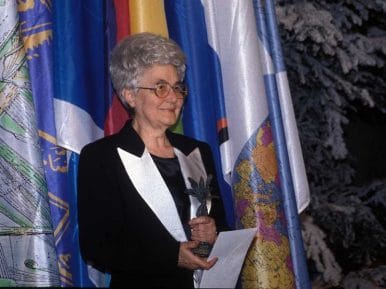
Nov 15, 2016 | Focolare Worldwide, Senza categoria
Live streaming can be followed from 10.00 to 13.00hrs and from 15.00 to 18.00hrs.  The event “Reinventing Peace” will be held at the UNESCO headquarters just two days after the first anniversary of the tragic terrorist attacks that happened in Paris. On the twentieth anniversary of the Prize for Peace Education awarded to Chiara Lubich, the Focolare Movement, in collaboration with the Directorate-General of UNESCO and the Permanent Observer Mission of the Holy See, will give voice to the commitment towards building peace and universal brotherhood lived with determination and creativity in many places all over the world. As Maria Voce, President of the Focolare Movement, said at the United Nations in April 2015, this daily commitment, which involves people of different cultures and religions, “is not limited to tollerance or to just accepting diversity”, but “it goes even beyond reconciliation, and creates, so to say, a new identity, which is broader and more shared. It is dialogue in action, which involves people of different beliefs, even non-religious ones, and urges towards answering to practical needs”. While referring to the actual commitment exercised even in situations affected by serious crises, Maria Voce stated that “it is not the time for half measures. If extreme violence is present, (…) the answer to it should be as radical, but structurally different, which means that one should answer with the extremism of dialogue. This dialogue requires maximum involvement; it is risky, demanding, challenging and aims at eradicating the roots of misunderstanding, fear and resentment”. The programme will be introduced by Marco Desalvo, President of New Humanity (the Focolare Movement NGO at the United Nations) and by a UNESCO Representative. Then, there will a word of welcome by Mons. Francesco Follo, Permanent Observer of the Holy See, followed by a talk from Jesús Morán, the Co-president of the Focolare Movement. This session will be concluded by Maria Voce, who will address the audience about “Reinventing peace”. The second part of the morning session will be interdisciplinary and intergenerational, and it will be enriched by multimedia contents. Concrete evidence in favour of unity and peace will be shared during the five brief panel talks on: Peace is Education; Peace is an Asset; Peace is Right; Peace is Green; Peace is Art. “Dialogue as a remedy for divisions in the world”, the theme for the afternoon session, will focus on key ideas for a new humanism that leads to the unity of the human family. The opening address of this session will be given by Enrico Letta, President of the Jacques Delors Institute, Discussions on two main topics will follow Rita Moussallem, co-director of the Focolare International Centre for Interreligious Dialogue will be the moderator on the panel for the first topic: “Religions: a problem or a resource for peace?”. The speakers will be Adnane Ben Abdelmajid Mokrani, Pontifical Institute for Arabic and Islamic Studies, Italy; Fabio Petito, International Relations at Sussex University, United Kingdom and Léonce Bekemans, economist and specialist of European Studies at “Chaire Jean Monnet”, Italy. The second topic: “Politics and economy in international disorder” will be moderated by Pál Tóth, Sophia University Institute, Italy. Pasquale Ferrara, Ambassador of Italy to Algeria; Silvia Costa, Chairperson of the European Parliament Commission on Culture and Education; and Damien Kattar, former Lebanese Minister of Finance will be the members on the second panel. Source: Press releases (SIF) Brochure: page1 – page 2 Invitation: Unesco Event Read Chiara Lubich’s speech in 1996
The event “Reinventing Peace” will be held at the UNESCO headquarters just two days after the first anniversary of the tragic terrorist attacks that happened in Paris. On the twentieth anniversary of the Prize for Peace Education awarded to Chiara Lubich, the Focolare Movement, in collaboration with the Directorate-General of UNESCO and the Permanent Observer Mission of the Holy See, will give voice to the commitment towards building peace and universal brotherhood lived with determination and creativity in many places all over the world. As Maria Voce, President of the Focolare Movement, said at the United Nations in April 2015, this daily commitment, which involves people of different cultures and religions, “is not limited to tollerance or to just accepting diversity”, but “it goes even beyond reconciliation, and creates, so to say, a new identity, which is broader and more shared. It is dialogue in action, which involves people of different beliefs, even non-religious ones, and urges towards answering to practical needs”. While referring to the actual commitment exercised even in situations affected by serious crises, Maria Voce stated that “it is not the time for half measures. If extreme violence is present, (…) the answer to it should be as radical, but structurally different, which means that one should answer with the extremism of dialogue. This dialogue requires maximum involvement; it is risky, demanding, challenging and aims at eradicating the roots of misunderstanding, fear and resentment”. The programme will be introduced by Marco Desalvo, President of New Humanity (the Focolare Movement NGO at the United Nations) and by a UNESCO Representative. Then, there will a word of welcome by Mons. Francesco Follo, Permanent Observer of the Holy See, followed by a talk from Jesús Morán, the Co-president of the Focolare Movement. This session will be concluded by Maria Voce, who will address the audience about “Reinventing peace”. The second part of the morning session will be interdisciplinary and intergenerational, and it will be enriched by multimedia contents. Concrete evidence in favour of unity and peace will be shared during the five brief panel talks on: Peace is Education; Peace is an Asset; Peace is Right; Peace is Green; Peace is Art. “Dialogue as a remedy for divisions in the world”, the theme for the afternoon session, will focus on key ideas for a new humanism that leads to the unity of the human family. The opening address of this session will be given by Enrico Letta, President of the Jacques Delors Institute, Discussions on two main topics will follow Rita Moussallem, co-director of the Focolare International Centre for Interreligious Dialogue will be the moderator on the panel for the first topic: “Religions: a problem or a resource for peace?”. The speakers will be Adnane Ben Abdelmajid Mokrani, Pontifical Institute for Arabic and Islamic Studies, Italy; Fabio Petito, International Relations at Sussex University, United Kingdom and Léonce Bekemans, economist and specialist of European Studies at “Chaire Jean Monnet”, Italy. The second topic: “Politics and economy in international disorder” will be moderated by Pál Tóth, Sophia University Institute, Italy. Pasquale Ferrara, Ambassador of Italy to Algeria; Silvia Costa, Chairperson of the European Parliament Commission on Culture and Education; and Damien Kattar, former Lebanese Minister of Finance will be the members on the second panel. Source: Press releases (SIF) Brochure: page1 – page 2 Invitation: Unesco Event Read Chiara Lubich’s speech in 1996
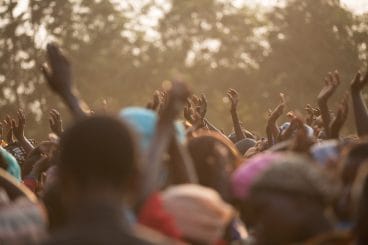
Nov 9, 2016 | Focolare Worldwide, Senza categoria
 The city of Como has risen to the headlines because of the notable influx of refugees that have been forced by barbed wire walls to divert their routes across Switzerland, as they travel to the countries of northern Europe in search of fortune, or reunion with their family members that arrived before them. The distance is very short, but the many border controls are rigorously imposed. There is a growing number of men, women, children and unaccompanied minors who are camped out waiting for an opportunity to evade border inspections. Bishop Coletti asked everyone to accept the challenge of welcoming, directing his appeal especially to the Church community that it might put into practice the Acts of Mercy during the Jubilee of Mercy which is an occasion for sharing and growth. “We took it as an appeal to us,” say the members of the local Focolare community, “and we immediately got to work, offering our services to the Diocesan Caritas that is on the front lines in organizing the assistance effort. There was a huge response from our community network that also includes people who are close to us: relatives, friends and acquaintances. We collected food, blankets and other basic necessities. We took turns covering the work schedule, providing showers and meals, distributing food, cooking and cleaning. In the evenings we serve up to five hundred meals. The faces we meet are disoriented, frightened, grateful and, at times, suspiscious. It’s hard to communicate with people who speak a foreign language. But just being there, tired and sweaty, offering a plate of food with a smile, trying to understand from their gesturing whether our guests are happy with the meal – makes us feel like we’re part of one big family.” One person from the meal service writes: “I was struck by the faith, the intensity of the Coptic Christians as they prayed before and after the meal.” And then: “In the eyes of our refugee brothers who we accompany to the showers and serve at table, we see Jesus who responds to us: ‘It’s Me!” Then; “After an evening of serving, when we meet with the other volunteers to share our experiences, your heart is bursting with emotions and positive resolutions.” On the patronal feast of the city of Como it was a special afternoon in the crowded basilica, with the bishop and civil authorities, with the full participation of Eritrean, Ethiopian and Somali Christian refugees, along with a representation of 500 volunteers. “The Gospel reading about the Final Judgement, in Italian, English and Tigrinya was very moving,” they reported. “Colomban Missionary Father Claudio, who belongs to our community and spent more than 30 years in those countries and knows their languages, has been working for weeks in the camps. The bishop entrusted their spiritual wellbeing to him, placing his very basilica at the complete disposal of the refugees. Jesus came to visit us today in these refugee brothers and sisters. And we want not only to accept Him, but to respond into the future in concrete ways.” Source: Movimento dei Focolari Italia
The city of Como has risen to the headlines because of the notable influx of refugees that have been forced by barbed wire walls to divert their routes across Switzerland, as they travel to the countries of northern Europe in search of fortune, or reunion with their family members that arrived before them. The distance is very short, but the many border controls are rigorously imposed. There is a growing number of men, women, children and unaccompanied minors who are camped out waiting for an opportunity to evade border inspections. Bishop Coletti asked everyone to accept the challenge of welcoming, directing his appeal especially to the Church community that it might put into practice the Acts of Mercy during the Jubilee of Mercy which is an occasion for sharing and growth. “We took it as an appeal to us,” say the members of the local Focolare community, “and we immediately got to work, offering our services to the Diocesan Caritas that is on the front lines in organizing the assistance effort. There was a huge response from our community network that also includes people who are close to us: relatives, friends and acquaintances. We collected food, blankets and other basic necessities. We took turns covering the work schedule, providing showers and meals, distributing food, cooking and cleaning. In the evenings we serve up to five hundred meals. The faces we meet are disoriented, frightened, grateful and, at times, suspiscious. It’s hard to communicate with people who speak a foreign language. But just being there, tired and sweaty, offering a plate of food with a smile, trying to understand from their gesturing whether our guests are happy with the meal – makes us feel like we’re part of one big family.” One person from the meal service writes: “I was struck by the faith, the intensity of the Coptic Christians as they prayed before and after the meal.” And then: “In the eyes of our refugee brothers who we accompany to the showers and serve at table, we see Jesus who responds to us: ‘It’s Me!” Then; “After an evening of serving, when we meet with the other volunteers to share our experiences, your heart is bursting with emotions and positive resolutions.” On the patronal feast of the city of Como it was a special afternoon in the crowded basilica, with the bishop and civil authorities, with the full participation of Eritrean, Ethiopian and Somali Christian refugees, along with a representation of 500 volunteers. “The Gospel reading about the Final Judgement, in Italian, English and Tigrinya was very moving,” they reported. “Colomban Missionary Father Claudio, who belongs to our community and spent more than 30 years in those countries and knows their languages, has been working for weeks in the camps. The bishop entrusted their spiritual wellbeing to him, placing his very basilica at the complete disposal of the refugees. Jesus came to visit us today in these refugee brothers and sisters. And we want not only to accept Him, but to respond into the future in concrete ways.” Source: Movimento dei Focolari Italia
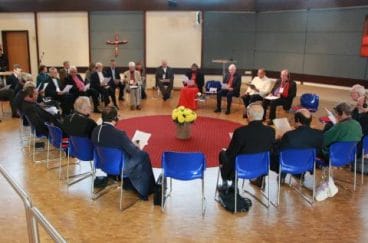
Nov 8, 2016 | Focolare Worldwide, Senza categoria

Photo credit: Ursel Haaf

Nov 6, 2016 | Focolare Worldwide, Senza categoria
 The preamble to the Constitution of UNESCO declares: “Since wars begin in the minds of human beings, it is in the minds of human beings that defenses of peace must be built.” This November 15th, Chiara Lubich and the Focolare Movement’s efforts in favour of peace, will be remembered at the headquarters of UNESCO in Paris, France. We offer some thoughts of Igino Giordani about peace. He had first-hand experience of two world wars. “Social wounds are called wars and disagreements. They tear at the social fabric leaving wounds that are unable to be healed. Ancient souls yearned for peace: “if you want peace, prepare war,” said the Romans. But in the spirit of the Gospel, true peace is never obtained by war, but by the sprouting of a peaceful disposition and by a harmony of minds. You don’t commit evil to obtain good. “If you want peace, prepare peace.” Here again, you bring about renewal by building peace, not with weapons, but with love that revives life. When love is on the move it generates brotherhood, equality, unity. It vanquishes envy, arrogance and discord. It gathers people together into one family and one mind. Human life is sacred. Do not kill! Do not take revenge! Love your enemy! No retaliating. The portion of humanity that followed Christ understood the angelic message of the Gospel that was sung on the night of his birth: ‘Peace on Earth’. One lover of peace is all that is needed. Jesus opposed the generals and bloody heroes with peaceful ones, victorious over themselves, inspirers of peace within themselves, among citizens and foreigners…. He created a new and more difficult heroism: that of avoiding war in all of its forms, forever breaking the dialectic between pardon and remission. This peace is the fruit of love which requires us to love even our enemies, even those that bear false witness against us. It prevents fractures, or it heals them. In the regimes of love, discord is an absurdity, a negation, and those that provoke discord certainly place themselves outside the spirit of Christ: and outside they remain until harmony has been restored.” Source: Igino Giordani, Il messaggio sociale del cristianesimo, (Rome: Città Nuova, 1935 and 1966) p 360-368.
The preamble to the Constitution of UNESCO declares: “Since wars begin in the minds of human beings, it is in the minds of human beings that defenses of peace must be built.” This November 15th, Chiara Lubich and the Focolare Movement’s efforts in favour of peace, will be remembered at the headquarters of UNESCO in Paris, France. We offer some thoughts of Igino Giordani about peace. He had first-hand experience of two world wars. “Social wounds are called wars and disagreements. They tear at the social fabric leaving wounds that are unable to be healed. Ancient souls yearned for peace: “if you want peace, prepare war,” said the Romans. But in the spirit of the Gospel, true peace is never obtained by war, but by the sprouting of a peaceful disposition and by a harmony of minds. You don’t commit evil to obtain good. “If you want peace, prepare peace.” Here again, you bring about renewal by building peace, not with weapons, but with love that revives life. When love is on the move it generates brotherhood, equality, unity. It vanquishes envy, arrogance and discord. It gathers people together into one family and one mind. Human life is sacred. Do not kill! Do not take revenge! Love your enemy! No retaliating. The portion of humanity that followed Christ understood the angelic message of the Gospel that was sung on the night of his birth: ‘Peace on Earth’. One lover of peace is all that is needed. Jesus opposed the generals and bloody heroes with peaceful ones, victorious over themselves, inspirers of peace within themselves, among citizens and foreigners…. He created a new and more difficult heroism: that of avoiding war in all of its forms, forever breaking the dialectic between pardon and remission. This peace is the fruit of love which requires us to love even our enemies, even those that bear false witness against us. It prevents fractures, or it heals them. In the regimes of love, discord is an absurdity, a negation, and those that provoke discord certainly place themselves outside the spirit of Christ: and outside they remain until harmony has been restored.” Source: Igino Giordani, Il messaggio sociale del cristianesimo, (Rome: Città Nuova, 1935 and 1966) p 360-368.
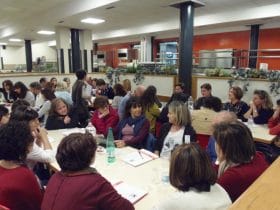
Nov 5, 2016 | Focolare Worldwide, Senza categoria
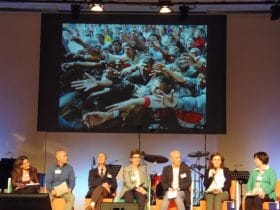 Hungary had been invaded by Soviet troops following the 1956 uprising. In response to the appeal of Pope Pius XII, Chiara Lubich wrote a letter that became the Magna Carta of a new calling in the Focolare Movement: the Volunteers of God, men and women who live the spirituality of unity and are especially committed to bringing the presence of God into society. Last October, a total of 1,840 participants from the wale of Italy, came together in Castel Gandolfo, Rome. “There’s a lot of desire to step up for our country, to overcome the fragmentation and to create a network of best practices that can provide mutual support. Now, it’s more necessary than ever before to give an intergenerational concrete response to the challenges of those that suffer in society.” This was the comment of one of the young participants that summarizes the three days of intense work. Focolare Movement president, Maria Voce, sent a message at the opening of the meeting in which she encouraged them to bear witness to the charism of unity in its more concrete expressions, keeping their gaze fixed on Jesus’s prayer “that all may be one” (Jn 17:21). The meeting continued with a series of reflections and testimonies on the central theme for the entire Movement this year: “Jesus Forsaken:
Hungary had been invaded by Soviet troops following the 1956 uprising. In response to the appeal of Pope Pius XII, Chiara Lubich wrote a letter that became the Magna Carta of a new calling in the Focolare Movement: the Volunteers of God, men and women who live the spirituality of unity and are especially committed to bringing the presence of God into society. Last October, a total of 1,840 participants from the wale of Italy, came together in Castel Gandolfo, Rome. “There’s a lot of desire to step up for our country, to overcome the fragmentation and to create a network of best practices that can provide mutual support. Now, it’s more necessary than ever before to give an intergenerational concrete response to the challenges of those that suffer in society.” This was the comment of one of the young participants that summarizes the three days of intense work. Focolare Movement president, Maria Voce, sent a message at the opening of the meeting in which she encouraged them to bear witness to the charism of unity in its more concrete expressions, keeping their gaze fixed on Jesus’s prayer “that all may be one” (Jn 17:21). The meeting continued with a series of reflections and testimonies on the central theme for the entire Movement this year: “Jesus Forsaken: 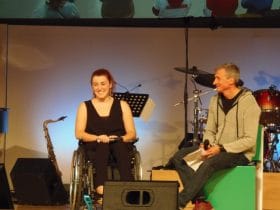 God’s aperture on the world, and the world’s aperture on God.” The testimonies were very moving. The voices of Pina and Tanina trembled as they told about their daily acts of heroism welcoming the thousands of refugees that have disembarked at the small island of Lampedusa in recent years: “We feel that these African brothers and sisters are our own until the time comes when we have to let them go. When they leave and disperse to many parts of the world we’re filled with emotions and concern for what still awaits them.” Journalist Riccardo Balaarm told how the painful experience of his disabled son led to a commitment among the National Paralympic Swimmers to promote the testimony of free swimmer and silver medallist Arjola Trimi from Rio, Brazil.
God’s aperture on the world, and the world’s aperture on God.” The testimonies were very moving. The voices of Pina and Tanina trembled as they told about their daily acts of heroism welcoming the thousands of refugees that have disembarked at the small island of Lampedusa in recent years: “We feel that these African brothers and sisters are our own until the time comes when we have to let them go. When they leave and disperse to many parts of the world we’re filled with emotions and concern for what still awaits them.” Journalist Riccardo Balaarm told how the painful experience of his disabled son led to a commitment among the National Paralympic Swimmers to promote the testimony of free swimmer and silver medallist Arjola Trimi from Rio, Brazil.  In the afternoons 150 groups discussed 35 topics: formation, social and political involvement; economy, health and ecology; art etc. These are all things that the Volunteers are called to deal with in their daily lives, through which they strive to fulfil their vocation as “first Christians of the twentieth century” as Chiara Lubich liked to call them: lay men and women that live the Gospel with the same fervour of the first Christians, committed to spending their lives for the building of a united world (Jn 17:21). A solemn moment was the signing of the act of initialization of the promotion of the Canonization Process for Volunteer Domenico Mangano from Viterbo, in the presence of Fr Andrea De Matteis, Vicar and Chancellor of the Diocese of Albano. https://youtu.be/EDCfdVUGa6s
In the afternoons 150 groups discussed 35 topics: formation, social and political involvement; economy, health and ecology; art etc. These are all things that the Volunteers are called to deal with in their daily lives, through which they strive to fulfil their vocation as “first Christians of the twentieth century” as Chiara Lubich liked to call them: lay men and women that live the Gospel with the same fervour of the first Christians, committed to spending their lives for the building of a united world (Jn 17:21). A solemn moment was the signing of the act of initialization of the promotion of the Canonization Process for Volunteer Domenico Mangano from Viterbo, in the presence of Fr Andrea De Matteis, Vicar and Chancellor of the Diocese of Albano. https://youtu.be/EDCfdVUGa6s

 “Every day we are presented with images of a world torn by conflicts of all kinds; we see walls being built, migrants and refugees fleeing from poverty and war; and contrasting forms of political self-interest fail to consider the human consequences of their actions.” This was Focolare President Maria Voce’s description of the world scene today, in a talk read on her behalf by Catherine Belzung. This world scene, she recalled, has often been described by Pope Francis as a “piecemeal third world war”. Its violence is unconventional, ubiquitous and pervasive; it is hard to defeat with the tools used up to now. … These conflicts can only be ended through collective commitment, not only on the part of the international community but by the community of all people in the world. No one can consider themselves excluded from this process. It must go through our streets, into our workplaces, our educational establishments, into sports centres and places of entertainment, communication and worship. The response to the “piecemeal world war” is to build world peace “one piece at a time”, through small steps, and concrete gestures. Everyone has a role to play. Everyone is responsible.” Maria Voce emphasised the commitment of international organisations, civil society, associations and movements. She mentioned her own movement which draws on the experience of 70 years of work for unity and peace initiated by Chiara Lubich and taken ahead in the most varied parts of the world in a 360ͦ dialogue, with in the Christian world, with other religions and with people of non-religious beliefs. It is a dialogue “founded on receptivity to people, on a deep understanding of their choices and ideas, appreciating all that is beautiful and positive, all that we might hold in common and that can create bonds. Fraternity can give rise to projects and actions in the complex political, economic, cultural and social fabric of our world. Fraternity Maria Voce affirmed, quoting Chiara Lubich “can give rise to projects and actions in the complex political, economic, cultural and social fabric of our world. Fraternity brings peoples out of their isolation and can offer the opportunity for development to those still excluded from it. It shows us how to resolve differences peacefully and relegates war to history books. Fraternity in action allows us to dream and even to hope for some kind of communion of goods between rich countries and poor countries, given that the scandalous economic inequality in today’s world is one of the main causes of terrorism. The deep need for peace expressed by humanity today shows that living as brothers and sisters is not only a value, not only a method, but is a global paradigm for political development».[1] “On these foundations, Maria Voce continued, it is possible to rethink peace, indeed to reinvent it.” She gave some examples, first of all a profound commitment to dialogue; engaging in projects that are not conditioned by short term or partial interests; breaking down the walls of indifference and acting responsibly to reduce inequality; promoting a culture of legality and caring for creation. Reinventing peace means loving our enemies. … Reinventing peace means forgiveness. Forgiveness is not the opposite of international justice but makes it possible for relationships to start again on a different footing. … This is why work is needed in terms of education and culture. We need to invest in knowledge and learning, as this Institution does … Lastly, reinventing peace means loving other countries as our own, loving other peoples, ethnicities and cultures as our own. Read the full text [1] Message to Prof. Benjamin Barber for the Interdependence Day, Rome, 10th November 2003.
“Every day we are presented with images of a world torn by conflicts of all kinds; we see walls being built, migrants and refugees fleeing from poverty and war; and contrasting forms of political self-interest fail to consider the human consequences of their actions.” This was Focolare President Maria Voce’s description of the world scene today, in a talk read on her behalf by Catherine Belzung. This world scene, she recalled, has often been described by Pope Francis as a “piecemeal third world war”. Its violence is unconventional, ubiquitous and pervasive; it is hard to defeat with the tools used up to now. … These conflicts can only be ended through collective commitment, not only on the part of the international community but by the community of all people in the world. No one can consider themselves excluded from this process. It must go through our streets, into our workplaces, our educational establishments, into sports centres and places of entertainment, communication and worship. The response to the “piecemeal world war” is to build world peace “one piece at a time”, through small steps, and concrete gestures. Everyone has a role to play. Everyone is responsible.” Maria Voce emphasised the commitment of international organisations, civil society, associations and movements. She mentioned her own movement which draws on the experience of 70 years of work for unity and peace initiated by Chiara Lubich and taken ahead in the most varied parts of the world in a 360ͦ dialogue, with in the Christian world, with other religions and with people of non-religious beliefs. It is a dialogue “founded on receptivity to people, on a deep understanding of their choices and ideas, appreciating all that is beautiful and positive, all that we might hold in common and that can create bonds. Fraternity can give rise to projects and actions in the complex political, economic, cultural and social fabric of our world. Fraternity Maria Voce affirmed, quoting Chiara Lubich “can give rise to projects and actions in the complex political, economic, cultural and social fabric of our world. Fraternity brings peoples out of their isolation and can offer the opportunity for development to those still excluded from it. It shows us how to resolve differences peacefully and relegates war to history books. Fraternity in action allows us to dream and even to hope for some kind of communion of goods between rich countries and poor countries, given that the scandalous economic inequality in today’s world is one of the main causes of terrorism. The deep need for peace expressed by humanity today shows that living as brothers and sisters is not only a value, not only a method, but is a global paradigm for political development».[1] “On these foundations, Maria Voce continued, it is possible to rethink peace, indeed to reinvent it.” She gave some examples, first of all a profound commitment to dialogue; engaging in projects that are not conditioned by short term or partial interests; breaking down the walls of indifference and acting responsibly to reduce inequality; promoting a culture of legality and caring for creation. Reinventing peace means loving our enemies. … Reinventing peace means forgiveness. Forgiveness is not the opposite of international justice but makes it possible for relationships to start again on a different footing. … This is why work is needed in terms of education and culture. We need to invest in knowledge and learning, as this Institution does … Lastly, reinventing peace means loving other countries as our own, loving other peoples, ethnicities and cultures as our own. Read the full text [1] Message to Prof. Benjamin Barber for the Interdependence Day, Rome, 10th November 2003. 






 God’s aperture on the world, and the world’s aperture on God.” The testimonies were very moving. The voices of Pina and Tanina trembled as they told about their daily acts of heroism welcoming the thousands of refugees that have disembarked at the small island of Lampedusa in recent years: “We feel that these African brothers and sisters are our own until the time comes when we have to let them go. When they leave and disperse to many parts of the world we’re filled with emotions and concern for what still awaits them.” Journalist Riccardo Balaarm told how the painful experience of his disabled son led to a commitment among the National Paralympic Swimmers to promote the testimony of free swimmer and silver medallist Arjola Trimi from Rio, Brazil.
God’s aperture on the world, and the world’s aperture on God.” The testimonies were very moving. The voices of Pina and Tanina trembled as they told about their daily acts of heroism welcoming the thousands of refugees that have disembarked at the small island of Lampedusa in recent years: “We feel that these African brothers and sisters are our own until the time comes when we have to let them go. When they leave and disperse to many parts of the world we’re filled with emotions and concern for what still awaits them.” Journalist Riccardo Balaarm told how the painful experience of his disabled son led to a commitment among the National Paralympic Swimmers to promote the testimony of free swimmer and silver medallist Arjola Trimi from Rio, Brazil.